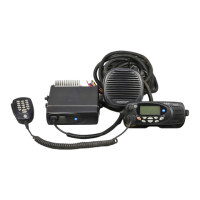TM8100/TM8200 Service Manual Frequency Synthesizer Fault Finding 219
© Tait Electronics Limited November 2007
Task 23 —
Check Transmit VCO
Check that the correct transmit frequency is synthesized. This is the
frequency of the transmit VCO output
SYN TX LO at the TX port shown in
Figure 9.11.
1. Enter the CCTM command 335 1 to set the transmit-receive switch
on (transmit mode).
2. Using a frequency counter, proceed as follows to observe the transmit
frequency at the
TX port before and after grounding the junction
between C541 and R547 (see Figure 9.11):
While holding the probe from the counter on the
TX port, use a pair
of tweezers to momentarily
ground the junction. The frequency
should change to:
The loop filter will hold its output steady at 13.3V. This should result
in a frequency equal to the maximum given in Table 9.4.
3. If the transmit frequency measured in Step 2 is correct, go to Step 4.
If it is incorrect, go to Task 25
. If no frequency is detected, go to
Task 26
.
4. Proceed as follows to observe the transmit frequency at the
TX port
before and after applying 3V DC to the junction of C541 and R547;
there is a convenient 3V level at R544 (see Figure 9.11):
While holding the probe on the
TX port, use the tweezers to
momentarily
apply 3V DC to the junction; do not touch the board
with your hand, and do not
allow the tweezers to touch any cans
when you remove them. The frequency should change to:
The loop filter will hold its output steady at about 0V. This should
result in a frequency equal to the minimum given in Table 9.4.
5. If the transmit frequency measured in Step 4 is correct, go to Ta s k 2 4
.
If it is incorrect, go to Task 25
. If no frequency is detected, go to
Task 26
.
TX port: maximum transmit frequency (see Table 9.4)
TX port: minimum transmit frequency (see Table 9.4)

